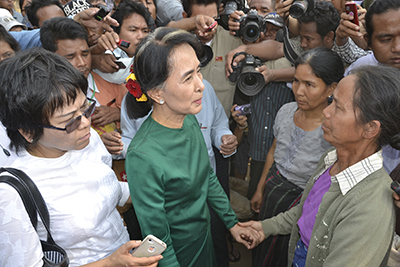Looking back, 2013 got off to an unpromising start, suggesting that the year would unlucky for Myanmar. The simmering conflict in Kachin State intensified late in 2012 and came to a boil early in the New Year. No sooner had that died down than communal violence that had begun in Rakhine State the previous year flared up again, this time spreading to other parts of the country. Meanwhile, opposition to a controversial mining project in Sagaing Region continued, despite Daw Aung San Suu Kyi’s efforts to assuage the concerns of those affected.
In the middle of the year, Myanmar’s quasi-civilian government hosted its largest international gathering to date: the World Economic Forum on East Asia. A few months later, the country took another step toward national reconciliation, with the first major public commemoration of the pro-democracy uprising of 1988, held on the 25th anniversary of that turning point in modern Myanmar history. On the ethnic conflict front, progress was slower in coming, but late in the year another milestone was marked with multilateral talks held in Myitkyina, the capital of Kachin State.
The year ended on a high note, as Myanmar played host to the Southeast Asian Games (SEA Games) for the first time since 1969. With a difficult year over, the country is ready to face its greatest challenge since returning as a key player on the regional and international stage: its chairmanship of the Association of Southeast Asian Nations in 2014.
War in Kachin State
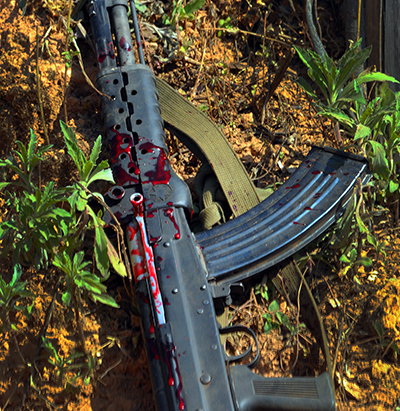
The year began as the previous year had ended—with conflict in Kachin State, where government forces continued an offensive against Kachin rebels that started on Christmas Day 2012.
On Jan. 19, the Tatmadaw, or government armed forces, unexpectedly declared an end to air strikes against Laiza, headquarters of the Kachin Independence Organization (KIO), after securing control of a nearby army outpost. However, the fighting showed no signs of abating, even as the government was hosting a major meeting in Naypyitaw with international donors, including Western governments, the United Nations and the World Bank. On Jan. 29, two more civilians were killed by Tatmadaw artillery fire in the village of Mayang, adding to the three killed by an attack on Laiza on Jan. 14.
By early February, the worst of the fighting had died down, but subsequent talks held through the year failed to result in a ceasefire agreement. By the end of 2013, there were estimated to be around 100,000 Kachin civilians displaced by the conflict that began in June 2011, most sheltering in KIO-controlled areas.
Democracy Icon Under Fire
Daw Aung San Suu Kyi, the leader of the opposition National League for Democracy, faced unprecedented criticism in 2013 for her handling of a number of contentious issues.
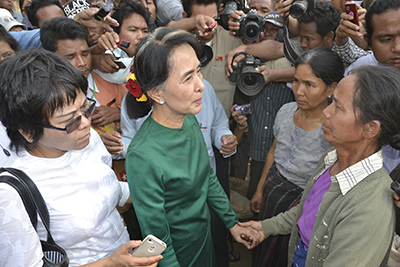
Already losing popularity among ethnic minorities for her silence on the intensifying Kachin conflict, her reputation as a rights defender took a further beating in March after a commission led by the democracy icon recommended that the controversial Chinese-backed Letpadaung copper mine in Sagaing Region be allowed to go ahead despite local opposition.
Internationally, critics faulted her for not speaking out against the persecution of Rohingya Muslims in Rakhine State—although an interview with the BBC in October, in which she emphasized that Buddhists in the state also lived in fear of communal clashes, gave her a boost back home.
Despite these controversies, however, she continued to collect accolades around the world, and in late March sat in the front row at an Armed Forces Day ceremony, signaling her greater acceptance by the generals who were once her jailers.
Communal Clashes Continue, and Spread
Violence between Buddhists and Muslims, with the latter bearing the brunt of attacks, continued in 2013, following the outbreak of deadly communal clashes in Rakhine State that began in June 2012.

Unlike the earlier violence, which involved Rohingya Muslims, a group regarded as non-citizens under Myanmar’s 1982 Citizenship Law, the riots that broke out in 2013 were more broadly directed at Muslims in areas across the country.
The first incident occurred in Meiktila, in central Myanmar, on March 20. An altercation between a Muslim shopkeeper and a Buddhist customer angered local Buddhists, who were further outraged after a Buddhist monk was doused in petrol and burned alive by Muslim youths. In the end, 40 people were counted among the dead, including 32 students and four teachers at an Islamic school.
Anti-Muslim riots soon spread to Bago Region, and over the ensuing months, separate incidents claimed lives and left many homeless in Okkan, Yangon Division; Lashio, Shan State; Kanbalu, Sagaing Region; and Thandwe, Rakhine State.
The spread of the violence coincided with the rise of the Buddhist nationalist 969 movement, whose most outspoken leader, U Wirathu, earned notoriety as the “Face of Buddhist Terror” on the cover of Time magazine.
Myanmar Hosts World Economic Forum
Two years into its transition to quasi-civilian rule, Myanmar had a chance in 2013 to showcase its reforms as host of the World Economic Forum on East Asia. Although the official theme of the forum was “Courageous Transformation for Inclusion and Integration” and President U Thein Sein shared the stage with the prime ministers of Laos and Vietnam at the opening ceremony on June 6, the focus was very much on the host country.
The event attracted business leaders and policy makers from around the world, and the mood was generally upbeat a month after consulting group McKinsey & Company released a report predicting that Myanmar’s economy could more than quadruple in size by 2030, to US$200 billion. However, other observers also noted more sobering realities: “It’s a country where still 26 percent of the population live in poverty [and] 37 percent are unemployed,” said Sushant Palakurthi Rao, head of Asia for the World Economic Forum, adding that much improvement was needed in education, health care and job training.
Opposition leader Daw Aung San Suu Kyi echoed these sentiments, saying after the forum concluded that job creation should be the country’s top economic priority. She also warned that the lack of rule of law in Myanmar might discourage investors from coming to the country.
1988 Uprising Commemorated
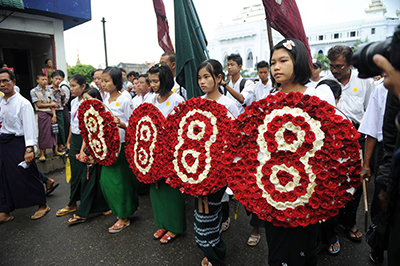
Twenty-five years after the people of Myanmar rose up in massive nationwide protests against military rule, the former student leaders of the nascent pro-democracy movement that took shape on Aug. 8, 1988, held their first large-scale public commemoration of the events of that tumultuous year. For three days, 88 Generation activists and others, including Daw Aung San Suu Kyi, ethnic Shan leader Khun Htun Oo, President’s Office Minister U Aung Min, and U Htay Oo of the ruling military-backed Union Solidarity and Development Party (USDP), gathered to remember the estimated 3,000 people killed and many others who suffered in the struggle to restore democracy in Myanmar.
In his monthly radio address on Sept. 1, President U Thein Sein hailed the event as a major step toward healing the wounds of the past. “The 88 people’s movement Silver Jubilee held early last month commemorates an important movement in our political history,” he said. “The fact that we can celebrate this event together shows us that we are moving toward a new political culture where those who ‘agree to disagree’ can still work together.” Later that month, he met the 88 Generation leaders for the first time.
His message was marred, however, by the fact that on Aug. 9, charges were laid against the leaders of an unauthorized march through three townships in downtown Yangon.
Myitkyina Talks End Inconclusively
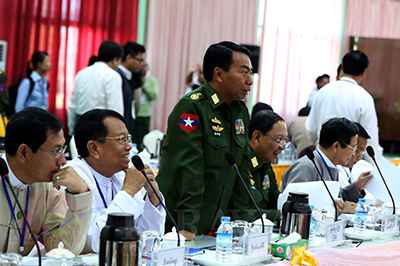
It was an important moment in Myanmar’s long history of civil conflict, but in the end, a meeting between representatives of the government and armed forces and many of the country’s ethnic armed groups in the Kachin State capital of Myitkyina failed to achieve a breakthrough. In a joint statement released on Nov. 5, the two sides said they shared the goal of reaching a nationwide ceasefire and engaging in a political dialogue, but their draft proposals for continuing talks made clear that irreconcilable difference remained. While the government army, or Tatmadaw, called on the ethnic militias to end their armed struggle, the armed groups said they wanted to see the formation of a “federal army” that better reflected Myanmar’s ethnic makeup.
The meeting in Myitkyina came immediately after a gathering of ethnic leaders in the Kachin Independence Organization (KIO) stronghold of Laiza, where they sought to work out their own common stance for negotiations with the government. Much of the debate centered on whether the priority should be to reach a nationwide ceasefire or hold a political dialogue. All parties generally agreed, however, that they favored a form of federalism—something the Tatmadaw has long opposed.
Myanmar Hosts SEA Games
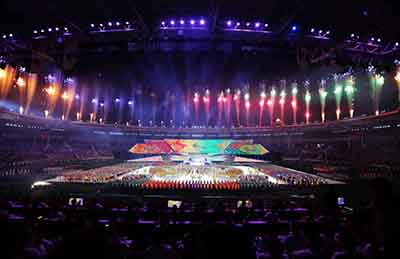
The SEA Games, which bring together the best athletes from around Southeast Asia, were held in Myanmar for the first time in 44 years from Dec. 11-22. Although the event was hailed as another important step in the country’s return to normalcy after decades of international isolation, it was not without controversy. Even before the games started, some participants complained that the host had selected sports that played to the strengths of local athletes, including some that were little known elsewhere.
The opening of the games also stirred mixed emotions, with many taking genuine pride in the spectacle, while others criticized what National League for Democracy MP U Min Thu described as a “Beijing-ized ceremony” reminiscent of the Olympic opener held in the Chinese capital on Aug. 8, 2008. China’s oversized involvement in the games, which included sending 700 coaches, managers, stage designers, technicians and other experts, and US$33 million in financial support, was seen by many as Beijing’s way of enhancing its soft power in Myanmar, where resentment of Chinese-backed megaprojects remains strong.
Despite these controversies, however, the successful completion of the games provided a much-needed boost to the country’s self-image, and set the stage for the even greater challenges Myanmar is expected to face in the future, as it raises its international profile.
Doubts, Hopes for Myanmar’s Asean Chairmanship
Questions were raised about Myanmar’s readiness to chair the Association of Southeast Asian Nations (Asean) in 2014 after anti-Muslim violence broke out again in Rakhine State while President U Thein Sein was attending a meeting of the regional grouping in Brunei in October. Despite this incident, however, the chairmanship was officially handed over to Myanmar at the conclusion of the meeting, marking the first time that the country would lead the bloc since joining in 1997.
Besides concerns about ongoing human rights issues in the country, many observers expressed doubts about Myanmar’s capacity to host some 1,100 meetings during its term as chair, given its well-known lack of basic infrastructure. At the meeting in Brunei, Foreign Minister U Wunna Maung Lwin sought to dispel those doubts. “We’ve been preparing for this chairmanship for quite a while,” he said. “It will not be a struggle for us.”
His regional colleagues also seemed optimistic, not only about Myanmar’s ability to deal with the logistical challenges of assuming a leadership role, but also the impact this role would have on the country’s transition to a more democratic form of governance.
“I am convinced that the Myanmar chairmanship of Asean will provide additional momentum to lock in the reform efforts that are already underway,” Indonesian Foreign Minister Natelagawa told The Irrawaddy.
This story first appeared in the January 2014 print issue of The Irrawaddy magazine.


